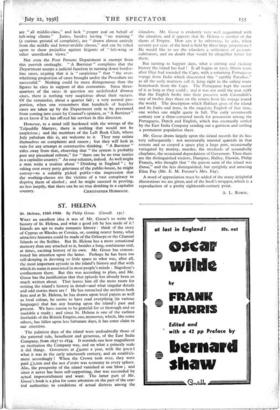ST. HELENA
St. Helena, 1502-1938. By Philip Gosse. (Cassell. 15s.) WHAT an excellent idea it was of Mr. Gosse's to write the history of St. Helena, and what a good job he has made of it ! Islands are apt to make romantic history : think of the story of Cyprus or Rhodes or Corsica, or, coming nearer home, what attractive histories could be made of the Orkneys or the Channel Islands or the Scillies. But St. Helena has a more sensational memory than any attached to it, besides a long, continuous and, at times, exciting history of its own. Mr. Gosse has concen- trated his attention upon the latter. Perhaps he has been too self-denying in devoting so little space to what was, after all, the most important episode in the island's history and that with which its name is associated in most people's minds : Napoleon's confinement there. But this was according to plan, and Mr. Gosse has the justification that that episode has already been so much written about. That leaves him all the more room for writing the island's history in detail—and what singular details and odd stories there are ! He has ransacked the archives both here and at St. Helena, he has drawn upon local papers as well as local colour, he seems to have read everything (in various languages) that has any bearing upon the island's past and present. We have reason to be grateful for so thorough and so readable a study ; and since St. Helena is one of the earliest footholds of the British Empire, one, moreover, which, like some others, has fallen upon less fortunate days, it has some claim to our attention.
The palmiest days of the island were undoubtedly those of the paternal rule, beneficent and generous, of the East India Company, from 1657 to 1834. It reminds one how magnificent an institution the Company was, and on what a princely scale it did things. Governors at £9,000 a year, with the poen' what it was in the early nineteenth century, and an establish- ment accordingly ! When the Crown took over, they were paid £2,000 and the mot d'ordre was economy in every sphere. Alas, the prosperity of the island vanished at one blow ; and since it never has been self-supporting,, that was succeeded by actual impoverishment and want. The latter part of Mr. Gosse's book is a plea for some attention on the part of the cen- tral authorities to conditions of actual distress among the islanders. Mr. Gosse is evidently very well acquainted with the situation, and it appears that St. Helena is another of the slums of Empire. How can it be otherwise, he asks, when seventy per cent. of the land is held by three large proprietors ? He would like to see the islanders a settlement of peasant-. cultivators, and no doubt that would be altogether better for them.
But turning to happier days, what a stirring and exciting history the island has had ! It all begins in 15oz, fifteen years after Diaz had rounded the Cape, with a returning Portuguese voyage from India which discovered this " earthly Paradise," as all the early mariners call it, lying right in the sailing route homewards from the Cape. The Portuguese kept the secret of it as long as they could ; and it was not until the year 1588 that the English broke into their preserve with Cavendish's stay of twelve days there on the return from his voyage round the world. The description which Hakluyt gives of the island and its fruits and trees, in the exquisite English of that time, one wishes one might quote in full. The early seventeenth century saw a three-cornered tussle for possession among the Portuguese, Dutch and English, which was eventually settled by the East India Company sending out a garrison and settling a permanent population there.
Mr. Gosse draws largely upon the island records for its his- tory subsequently : not unnaturally internal quarrels in that remote and so cooped a space play a large part, occasionally variegated by mutiny, murder, the misdeeds of scoundrelly chaplains, the occasional depredations of Governors. Then there are the distinguished visitors, Dampier, Halley, Darwin, Philip Francis, who thought that " the patron saint of the island was Ennui," and the less distinguished, but sprightly and amusing Eliza Fay (Mr. E. M. Forster's Mrs. Fay).
A word of appreciation must be added of the many delightful illustrations we are given, and of the book's wrapper, which is a reproduction of a pretty eighteenth-century print.
A. L. ROWSE.











































 Previous page
Previous page